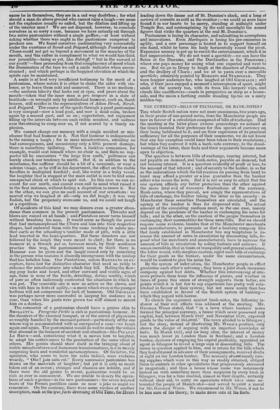THE CURRENCY—BILLS OF EXCHANGE, OR BANK-NOTES?
THE whole Scotch nation were not more unanimous, two years ago, in their praise of one-pound notes, than the Manchester people are now in favour of a circulation composed of bills of exchange. Had the meeting at the latter place (whose proceedings we noticed at the time) founded their preference for this species of currency on their being habituated to it, and-on their experience of its practical sufficiency for all the purposes of their commerce, we do not know that any fair exception could have been taken to their resolutions ; but when they contrast it with a bank-note currency, to the disad- vantage of the latter, their facts and their arguments become more open to objection.
The question is between bills of exchange, bearing interest, but not payable on demand, and bank-notes, payable on demand, but not bearing interest. It is a question evidently of profit or loss, to the amount of that interest ; and of security to the holder, in as far as the indorsations which the bill receives on passing from hand to hand may afford a greater or a less guarantee than the banker offers who issues the note. But it is not so easy to admit that the one system affords any better protection than the other against the more fatal evil of excessive fluctuations of the currency. Bank-notes, where they prevail, are simply the representatives of bills of exchange, the banker taking the latter as his security : in Manchester these securities themselves are circulated, and the agency of the banker is thus far dispensed with. The actual amount of the circulating medium must, in the one case, mainly depend on the prudence of the banker in exchanging his notes for bills ; and in the other, on the caution of the people themselves in exchanging their commodities for these same bills. But we should require some evidence, besides that of the Manchester merchants and manufacturers, to persuade us that a banking company like that lately established in Manchester has any temptation to in- crease the amount of notes in circulation by discounting bills, be- yond what the merchants and manufacturers have to increase the amount of bills in circulation by selling fustians and calicoes. It seems incredible, that in times of tranquillity and general confidence, the latter would, with sleepless caution, reject such bills of exchange for their goods as the banker, under the same circumstances, would be content to give his note S for.
By the system of indorsation, the Manchester people in effect guarantee each other's solvency ; they form a joint stock insurance company against bad debts. 'Whether this interweaving of inte- rests protects them from the influence of panics, and whether in times Of panic this union of strength supports them better, are points which it is but fair to say experience has pretty well esta- blished in favour of their system; but not more surely than has been established in favour of the Scotch system of banking— which they regard with horror.
To clench the argument against bank-notes, the following in- stance of their evil effects was adduced at the meeting. Mr. GEORGE WOOD stated, that "in a town where bankers' notes formed the principal currency, a house which never possessed any capital, had, between March 1327 and November 1828, exported goods to the value of 365,0001." The town alluded to is Glasgow ; but the story, instead of illustrating Mr. Woon's position, only shows the danger of arguing with an imperfect knowledge of facts. In March 1827, and for long after, the interest of money
was much lower in London than in Scotland; and a London banker, desirous of employing his capital profitably, appointed an agent in Glasgow to invest a large sum in discounting bills. The house in question applied to him, and in return for the bills which they had obtained in advance of their consignments, received drafts at sight on the London banker. The necessity af-e-arptinually rais- ing supplies which were in this way so readily obtained, obliged them to embark in other speculations that progressively increased in magnitude ; and thus a house whose name was notoriously looked on with something more than suspicion by every bank in Glasgow, was for a time enabled, almost in their despite, certainly
without their aid, to carry on operations which have since as- tounded the people of Manchester—and served to point a moral for MY. GEORGE WOOD. We recommend to Mr. WOOD, if not to be less sure of his theory, to make more sure of his facts,





















 Previous page
Previous page